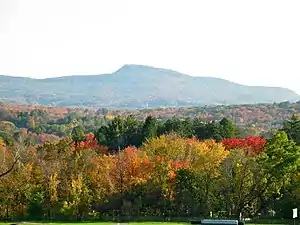Amherst, Massachusetts
Amherst (/ˈæmərst/ ⓘ)[4] is a city in Hampshire County, Massachusetts, United States, in the Connecticut River valley. Amherst, with a council–manager form of government, is considered a city under Massachusetts state law. Amherst is one of several Massachusetts municipalities that have city forms of government but retain "The Town of" in their official names.[5] At the 2020 census, the population was 39,263,[6] making it the highest populated municipality in Hampshire County (although the county seat is Northampton). The town is home to Amherst College, Hampshire College, and the University of Massachusetts Amherst, three of the Five Colleges.
Amherst | |
|---|---|
| Town of Amherst | |
   _-_IMG_6526.JPG.webp) 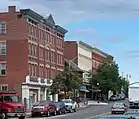 Left-right from top: Downtown Amherst, Congregational Church in North Amherst, University of Massachusetts Amherst, Town Hall, Downtown Amherst | |
 Flag  Seal | |
| Nickname: | |
 Location in Hampshire County in Massachusetts | |
 Amherst  Amherst  Amherst | |
| Coordinates: 42°23′N 72°31′W | |
| Country | United States |
| State | Massachusetts |
| County | Hampshire |
| Settled | 1703 |
| Incorporated | February 13, 1759 |
| Named for | Jeffery Amherst, 1st Baron Amherst |
| Government | |
| • Type | Council–manager |
| Area | |
| • Total | 27.7 sq mi (71.8 km2) |
| • Land | 27.6 sq mi (71.5 km2) |
| • Water | 0.1 sq mi (0.3 km2) |
| Elevation | 295 ft (90 m) |
| Population (2020) | |
| • Total | 39,263 |
| • Density | 1,422/sq mi (549.1/km2) |
| Time zone | UTC−5 (Eastern) |
| • Summer (DST) | UTC−4 (Eastern) |
| ZIP Codes | 01002, 01003 (UMass), 01004 (post office boxes), 01059 (North Amherst post office) |
| Area code | 413 |
| FIPS code | 25-01325 |
| GNIS feature ID | 0618195 |
| Website | www |
Amherst has three census-designated places: Amherst Center, North Amherst, and South Amherst.
Amherst is part of the Springfield, Massachusetts Metropolitan Statistical Area. Lying 22 miles (35 km) north of the city of Springfield, Amherst is considered the northernmost town in the Hartford–Springfield Metropolitan Region, "The Knowledge Corridor". Amherst is also located in the Pioneer Valley, which encompasses Hampshire, Hampden and Franklin counties.
Name
The name of the town is pronounced without the h ("AM-erst") by natives and long-time residents,[7] giving rise to the local saying, "only the 'h' is silent", in reference both to the pronunciation and to the town's politically active populace.[8]
History
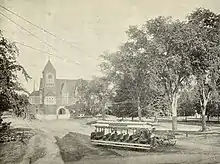
The earliest known document of the lands now comprising Amherst is the deed of purchase dated December 1658 between John Pynchon of Springfield and three native inhabitants, referred to as Umpanchla, Quonquont, and Chickwalopp.[9] According to the deed, "ye Indians of Nolwotogg (Norwottuck) upon ye River of Quinecticott (Connecticut)" sold the entire area in exchange for "two Hundred fatham of Wampam & Twenty fatham, and one large Coate at Eight fatham wch Chickwollop set of, of trusts, besides severall small giftes" [sic].
Amherst was first visited by Europeans no later than 1665, when Nathaniel Dickinson surveyed the lands for its mother town Hadley. The first permanent English settlements arrived in 1727. It remained a part of Hadley, even when it gained precinct status in 1734, before becoming a township in 1759.
When it incorporated, the colonial governor assigned the town the name "Amherst" after Jeffery Amherst, 1st Baron Amherst. Many a colonial governor at the time scattered his name during the influx of new town applications, which is why several towns in the Northeast bear the name. Amherst was Commander-in-Chief of the forces of North America during the French and Indian War who, according to popular legend, singlehandedly won Canada for the British and banished France from North America. Popular belief has it that he supported the American side in the Revolutionary War and resigned his commission rather than fight for the British. Baron Amherst actually remained in the service of the Crown during the war—albeit in Great Britain rather than North America—where he organized the defense against the proposed Franco-Spanish Armada of 1779. Nonetheless, his previous service in the French and Indian War meant he remained popular in New England. Amherst is also infamous for recommending, in a letter to a subordinate, the use of smallpox-covered blankets in warfare against the Native Americans along with any "other method that can serve to Extirpate this Execrable Race".[10] For this reason, there have been occasional ad hoc movements to rename the town.[11]
Amherst celebrated its 250th anniversary in 2009. The Amherst 250th Anniversary Celebration Committee and Amherst Historical Society organized events, including a book published by the Historical Society and written by Elizabeth M. Sharpe, Amherst A to Z.
In 2021 the City Council voted to establish the Amherst African Heritage Reparation Assembly to study reparations for the town's black residents. In 2022, at the Assembly's suggestion, the City Council approved $2,000,000 of initial funding for reparations.
History of town government
The Town converted from an open town meeting to a representative town meeting form in 1938.[12] In 1953, Amherst voters passed the "Town Manager Act", which established the office of a town manager and reduced a number of elected positions.[12] In 1995, a charter commission was approved to study Amherst's government; the charter majority recommended a seven-person Council and a mayor, while also maintaining a reduced size representative Town Meeting (150).[13] This proposal failed in two successive votes.[12]
In 2001, the League of Women Voters Amherst made a number of recommendations that were adopted in 2001 in the form of a revised "Amherst Town Government Act".[14] An effort shortly thereafter to amend the charter to eliminate the town meeting, and establish an elected mayor and a nine-member Town Council,[15] was rejected by voters twice, first in spring 2003 by fourteen votes and again on March 29, 2005 by 252 votes.
In 2016, a charter commission was approved to study Amherst's government. A majority of commissioners proposed a charter that would establish a 13-member council with no mayor.[16][17] This proposal was voted on the March 27, 2018 local ballot,[18] and was passed by over 1,000 votes, a 58% majority.[19] The new town council was sworn in on December 2, 2018.[20]
Geography
According to the United States Census Bureau, Amherst has a total area of 27.7 square miles (71.8 km2), of which 27.6 square miles (71.5 km2) are land and 0.12 square miles (0.3 km2), or 0.48%, are water.[21] The town is bordered by Hadley to the west, Sunderland and Leverett to the north, Shutesbury, Pelham, and Belchertown to the east, and Granby and South Hadley to the south. The highest point in the town is on the northern shoulder of Mount Norwottuck at the southern border of the town; the peak is in Granby but the town's high point is a few yards away and is about 1,100 feet (340 m). This point is located in the Mount Holyoke Range, which forms the so-called "Tofu Curtain". Amherst is nearly equidistant from Massachusetts' borders with Connecticut and Vermont.

Amherst's ZIP Code of 01002 is the second-lowest number in the continental United States after Agawam (not counting codes used for specific government buildings such as the IRS).
Climate
Amherst has a humid continental climate that under the Köppen system marginally falls into the warm-summer category (Dfb). It is interchangeable with the hot-summer subtype Dfa with July means hovering around 71.7 °F (22.1 °C). Winters are cold and snowy, albeit daytime temperatures often remain above freezing. Under the 2012 USDA Plant Hardiness Zone system, Amherst (ZIP Code 01002) is in zone 5b;[22] however, Amherst closely borders zone 6a, which penetrates into Massachusetts in the Connecticut River Valley, and climate change may be shifting those zones.[23]
| Climate data for Amherst, Massachusetts, 1991–2020 normals, extremes 1893–present | |||||||||||||
|---|---|---|---|---|---|---|---|---|---|---|---|---|---|
| Month | Jan | Feb | Mar | Apr | May | Jun | Jul | Aug | Sep | Oct | Nov | Dec | Year |
| Record high °F (°C) | 70 (21) |
78 (26) |
85 (29) |
93 (34) |
98 (37) |
101 (38) |
104 (40) |
100 (38) |
99 (37) |
90 (32) |
82 (28) |
72 (22) |
104 (40) |
| Mean maximum °F (°C) | 55.4 (13.0) |
57.1 (13.9) |
66.4 (19.1) |
80.6 (27.0) |
87.9 (31.1) |
94.6 (34.8) |
93.2 (34.0) |
91.2 (32.9) |
88.1 (31.2) |
78.3 (25.7) |
68.9 (20.5) |
58.5 (14.7) |
95.0 (35.0) |
| Average high °F (°C) | 34.0 (1.1) |
37.0 (2.8) |
45.2 (7.3) |
58.2 (14.6) |
69.5 (20.8) |
78.0 (25.6) |
83.1 (28.4) |
81.5 (27.5) |
74.4 (23.6) |
64.9 (18.3) |
49.7 (9.8) |
39.2 (4.0) |
59.6 (15.3) |
| Daily mean °F (°C) | 23.9 (−4.5) |
26.2 (−3.2) |
34.7 (1.5) |
46.3 (7.9) |
57.5 (14.2) |
66.5 (19.2) |
71.7 (22.1) |
69.9 (21.1) |
62.3 (16.8) |
50.2 (10.1) |
39.4 (4.1) |
30.0 (−1.1) |
48.2 (9.0) |
| Average low °F (°C) | 13.8 (−10.1) |
15.3 (−9.3) |
24.1 (−4.4) |
34.4 (1.3) |
45.4 (7.4) |
55.0 (12.8) |
60.2 (15.7) |
58.3 (14.6) |
50.3 (10.2) |
38.6 (3.7) |
29.1 (−1.6) |
20.8 (−6.2) |
37.1 (2.8) |
| Mean minimum °F (°C) | −5.7 (−20.9) |
−2.6 (−19.2) |
6.5 (−14.2) |
22.3 (−5.4) |
30.3 (−0.9) |
40.5 (4.7) |
49.5 (9.7) |
46.0 (7.8) |
35.5 (1.9) |
24.7 (−4.1) |
14.5 (−9.7) |
3.4 (−15.9) |
−8.4 (−22.4) |
| Record low °F (°C) | −30 (−34) |
−27 (−33) |
−17 (−27) |
8 (−13) |
24 (−4) |
29 (−2) |
39 (4) |
32 (0) |
25 (−4) |
12 (−11) |
−4 (−20) |
−22 (−30) |
−30 (−34) |
| Average precipitation inches (mm) | 3.36 (85) |
2.93 (74) |
3.47 (88) |
3.79 (96) |
3.71 (94) |
4.46 (113) |
4.12 (105) |
4.12 (105) |
4.62 (117) |
4.74 (120) |
3.38 (86) |
3.89 (99) |
46.59 (1,182) |
| Average snowfall inches (cm) | 8.1 (21) |
11.0 (28) |
7.3 (19) |
1.0 (2.5) |
0.0 (0.0) |
0.0 (0.0) |
0.0 (0.0) |
0.0 (0.0) |
0.0 (0.0) |
0.0 (0.0) |
1.6 (4.1) |
7.5 (19) |
36.5 (93.6) |
| Average extreme snow depth inches (cm) | 7.3 (19) |
8.9 (23) |
7.0 (18) |
0.9 (2.3) |
0.0 (0.0) |
0.0 (0.0) |
0.0 (0.0) |
0.0 (0.0) |
0.0 (0.0) |
0.3 (0.76) |
1.2 (3.0) |
5.7 (14) |
11.8 (30) |
| Average precipitation days (≥ 0.01 in) | 10.8 | 9.2 | 9.5 | 11.1 | 12.6 | 11.3 | 11.0 | 10.0 | 8.9 | 10.8 | 9.5 | 10.6 | 125.3 |
| Average snowy days (≥ 0.1 in) | 5.6 | 5.0 | 3.1 | 0.6 | 0.0 | 0.0 | 0.0 | 0.0 | 0.0 | 0.1 | 0.9 | 3.7 | 19.0 |
| Source 1: NOAA[24] | |||||||||||||
| Source 2: National Weather Service[25] | |||||||||||||
Demographics
| Year | Pop. | ±% |
|---|---|---|
| 1790 | 1,233 | — |
| 1800 | 1,258 | +2.0% |
| 1810 | 1,469 | +16.8% |
| 1820 | 1,917 | +30.5% |
| 1830 | 2,631 | +37.2% |
| 1840 | 2,550 | −3.1% |
| 1850 | 3,057 | +19.9% |
| 1860 | 3,206 | +4.9% |
| 1870 | 4,035 | +25.9% |
| 1880 | 4,298 | +6.5% |
| 1890 | 4,512 | +5.0% |
| 1900 | 5,028 | +11.4% |
| 1910 | 5,112 | +1.7% |
| 1920 | 5,550 | +8.6% |
| 1930 | 5,883 | +6.0% |
| 1940 | 6,410 | +9.0% |
| 1950 | 10,856 | +69.4% |
| 1960 | 13,718 | +26.4% |
| 1970 | 26,331 | +91.9% |
| 1980 | 33,229 | +26.2% |
| 1990 | 35,228 | +6.0% |
| 2000 | 34,874 | −1.0% |
| 2010 | 37,819 | +8.4% |
| 2020 | 39,263 | +3.8% |
| 2022 | 40,059 | +2.0% |
| * = population estimate[26] Source: United States census records and Population Estimates Program data.[27][28][29][30][31][32][33][34][35][36][37][38] | ||
As of the 2010 U.S. Census, there were 37,819 people, 9,259 households, and 4,484 families residing in the town. There were 9,711 housing units. The racial makeup of the town was 76.9% White, 5.4% Black or African American, 0.2% Native American, 10.9% Asian, 0.03% Pacific Islander, 2.4% some other race, and 4.1% from two or more races. 7.3% of the population were Hispanic or Latino of any race.[39]
Of the 9,259 households in the town, 23.4% had children under the age of 18 living with them, 35.6% were headed by married couples living together, 16.3% had a female householder with no husband present, and 51.6% were non-families. Of all households, 27.3% were made up of individuals, and 9.7% were someone living alone who was 65 years of age or older. The average household size was 2.44 and the average family size was 2.88.[39]
In the town, 10.0% of the population were under the age of 18, 55.7% were from 18 to 24, 13.3% were from 25 to 44, 13.6% were from 45 to 64, and 7.4% were 65 years of age or older. The median age was 21.6 years. For every 100 females, there were 95.8 males. For every 100 females age 18 and over, there were 94.7 males.[39]
For the period 2011–2015, the estimated median annual income for a household in the town was $48,059, and the median income for a family was $96,005. Male full-time workers had a median income of $64,750 versus $39,278 for females. The per capita income for the town was $18,905. About 8.7% of families and 34.7% of the population were below the poverty line, including 18.2% of those under age 18 and 4.5% of those age 65 or over.[40]
Of residents 25 years old or older, 41.7% have a graduate or professional degree, and only 4.9% did not graduate from high school. The largest industry is education, health, and social services, in which 51.9% of employed persons work.
These statistics given above include some but not all of the large student population, roughly 30,000 in 2010, many of whom only reside in the town part of the year. Amherst is home to thousands of part-time and full-time residents associated with the University of Massachusetts Amherst, Amherst College, and Hampshire College.
Income
Data is from the 2009–2013 American Community Survey 5-Year Estimates.[41][42][43]
| Rank | ZIP Code (ZCTA) | Per capita income |
Median household income |
Median family income |
Population | Number of households |
|---|---|---|---|---|---|---|
| Massachusetts | $35,763 | $66,866 | $84,900 | 6,605,058 | 2,530,147 | |
| Hampshire County | $29,460 | $61,227 | $81,385 | 159,267 | 58,828 | |
| United States | $28,155 | $53,046 | $64,719 | 311,536,594 | 115,610,216 | |
| 1 | 01002 | $27,691 | $54,422 | $96,929 | 29,266 | 9,248 |
| Amherst | $19,796 | $53,191 | $96,733 | 38,651 | 8,583 | |
| 2 | 01003 (UMass Amherst Campus) | $3,531 | $N/A | $N/A | 11,032 | 16 |
Economy
Major employers in Amherst include University of Massachusetts Amherst, Amherst College, William D. Mullins Memorial Center, Hampshire College, and Amherst-Pelham Regional School District.[44]
Arts and culture
Points of interest
- Amherst Center Cultural District, formed in 2016, and the Amherst Business Improvement District[45]
- Amherst Area Chamber of Commerce
- Amherst Cinema Arts Center: a local non-profit theater showing mostly arthouse and independent films[46]
- Amherst History Museum, which opened in 1916 and is governed by the Amherst Historical Society[47]
- Beneski Museum of Natural History, including the Hitchcock Ichnological Cabinet
- Emily Dickinson Museum, birthplace and lifelong residence of poet Emily Dickinson, now a museum. She is buried nearby in West Cemetery on Triangle Street.
- Eric Carle Museum of Picture Book Art
- Hitchcock Center for the Environment, an environmental education center on the grounds of Hampshire College
- Jones Library
- Mead Art Museum at Amherst College: 18,000 items with a particular strength in American art
- Theodore Baird Residence, designed by architect Frank Lloyd Wright
- W. E. B. Du Bois Library at the University of Massachusetts Amherst: the tallest academic library in the United States
- Yiddish Book Center at Hampshire College
Sports
- Games were played in town during the 1996 World Junior Ice Hockey Championships.
- Amherst Regional High School's 1992–93 girls' basketball team inspired the book In These Girls, Hope is a Muscle by Madeleine Blais.[48]
- The University of Massachusetts Amherst's Ultimate Frisbee Team was ranked first in the Division 1 Men's Ultimate league for the 2017 season.[49][50]
- The Amherst Invitational, founded in 1992, is the oldest high school Ultimate Frisbee tournament in the United States.[51]
Government
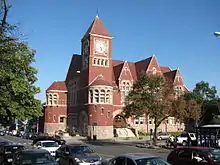
Amherst has a town council for its legislative branch and a town manager for its executive branch. The town manager is appointed by the town council.[52]
Amherst's town council consists of ten district councilors and three councilors-at-large. Two district councilors are elected from each of five districts in Amherst. The three councilors-at-large are elected by the whole town. Each councilor serves a two-year term, except for the first council, where each member will serve a three-year term.[52]
Amherst also has the following elected bodies:[52]
- A five-member School Committee with two-year terms.
- A six-member library board of trustees with two-year terms.
- A single Oliver Smith Will Elector with a two-year term.
Amherst also has a five-member housing authority where three of the five members are elected by voters. Each member serves a two-year term.[52]
| Town Council Members[53] | |||
|---|---|---|---|
| Title | Name | District | First elected |
| Councilor-at-Large | Mandi Jo Hanneke | At-Large | 2018 |
| Councilor-at-Large | Ellisha Walker | At-Large | 2021 |
| Councilor-at-Large | Andrew Steinberg | At-Large | 2018 |
| District Councilor | Michele Miller | 1 | 2021 |
| District Councilor | Cathy Schoen | 1 | 2018 |
| District Councilor | Lynn Griesemer | 2 | 2018 |
| District Councilor | Patricia De Angelis | 2 | 2018 |
| District Councilor | Dorothy Pam | 3 | 2018 |
| District Councilor | Jennifer Taub | 3 | 2021 |
| District Councilor | Anika Lopes | 4 | 2021 |
| District Councilor | Pam Rooney | 4 | 2021 |
| District Councilor | Shalini Bahl-Milne | 5 | 2018 |
| District Councilor | Ana Devlin Gauthier | 5 | 2021 |
State and federal representation
In the Massachusetts Senate Amherst is in the "Hampshire, Franklin and Worcester" district,[54] represented by Democratic State Senator Jo Comerford since January 2019. In the Massachusetts House of Representatives Amherst is in the 3rd Hampshire district,[55] represented by Democratic State Representative Mindy Domb since January 2019. Amherst is part of the Eighth Massachusetts Governor's Council district and has represented by Tara Jacobs since January 2023.[56]
Amherst is represented at the federal level by an all-Democratic delegation, including Senators Elizabeth Warren and Ed Markey, and by Representative Jim McGovern of the Second Congressional District of Massachusetts.
Voter registration

Voter registration data is from the state election enrollment statistics.
| Registered Voters and Party Enrollment[58] | |||||||
|---|---|---|---|---|---|---|---|
| Year | Democratic | Republican | Unenrolled | Total | |||
| 2004 | 8,522 | 47.8% | 1,231 | 6.9% | 7,623 | 42.8% | 17,816 |
| 2006 | 8,350 | 49.2% | 1,076 | 6.3% | 7,228 | 42.6% | 16,980 |
| 2008 | 9,343 | 49.3% | 1,076 | 5.7% | 8,257 | 43.6% | 18,956 |
| 2010 | 8,675 | 49.6% | 948 | 5.4% | 7,661 | 43.8% | 17,501 |
| 2012 | 10,324 | 46% | 1,219 | 5.4% | 10,665 | 47.6% | 22,425 |
| 2014 | 9,645 | 45% | 1,156 | 5.4% | 10,454 | 48.8% | 21,431 |
| 2016 | 10,414 | 46.9% | 1,146 | 5.2% | 10,202 | 46% | 22,196 |
| 2018 | 10,249 | 46.6% | 1,025 | 4.7% | 10,331 | 47% | 21,993 |
| 2020 | 8,562 | 51.7% | 575 | 3.5% | 7,166 | 43.3% | 16,551 |
| 2022 | 7,222 | 51% | 414 | 3% | 6,441 | 45% | 14,243 |
Politics
Like many college towns, Amherst leans heavily Democratic. In each of the presidential elections from 2012 to 2020, more than 80% of Amherst's votes went to the Democratic candidate.
In the 2020 United States Presidential Election, Democrat Joe Biden received 90.3 percent of the vote to incumbent Republican Donald Trump's 7.4 percent.[59] In the 2000 United States Presidential Election, Amherst was one of a small number of places that delivered more votes for Green Party candidate Ralph Nader (who took 24% of the vote) than Republican candidate George W. Bush, who received just 13%.[60]
Education
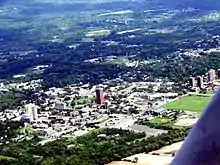
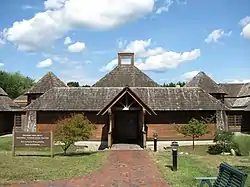
The town is part of the Amherst Regional School District along with Leverett, Pelham, and Shutesbury. Amherst has three elementary schools: Crocker Farm Elementary School, Fort River Elementary School, and Wildwood Elementary School serving K–6. Students in Amherst then attend Amherst Regional Middle School for grades 7–8. High school students then attend Amherst Regional High School.
There are three tertiary institutions located in the town: the public University of Massachusetts Amherst (the flagship of the UMass system), and two private liberal arts colleges—Amherst College and Hampshire College.
Infrastructure
Bus
The Pioneer Valley Transit Authority, funded by local governments and the Five College Consortium, provides public transportation in the area, operated by University of Massachusetts Transportation Services. Service runs well into the early morning hours on weekends when school is in session. Students attending any colleges in the Five Colleges Consortium have a fee included in their tuition bills (service fee for UMass Amherst students and student activity fees for the other colleges) for each semester that prepays their bus fares for the semester. UMass Transit buses operate via a proof-of-payment system, in which there are random inspections of student identification cards and bus passes and transfers.
Peter Pan Bus Lines provides service between Amherst and Springfield, Boston, and other locations in New England.[61] Megabus provides service between New York City, Amherst, and Burlington, Vermont.[62]
Rail
Amtrak rail service is available in nearby Northampton on the Vermonter service between Washington, D.C., and St. Albans, Vermont. More frequent Amtrak service to New York City and Washington, D.C., is available from Union Station in Springfield.
Airports
The closest major domestic and limited international air service is available through Bradley International Airport (BDL) in Windsor Locks, Connecticut. Bradley is located approximately one hour's driving time from Amherst. Major international service is available through Logan International Airport (BOS) in Boston, 90 miles away.
General aviation service is close by, at Northampton Airport, Westover Metropolitan Airport, and Turners Falls Airport.
Police report
Since 1997, the local newspaper, the Amherst Bulletin, has published a weekly log of phone calls received by the Amherst Police Department.[63] This police report, whose tone is deadpan and often unintentionally humorous, has been the subject of at least two books[64][65] and a 2002 article in Harper's Magazine, "Gone When Police Got There".[66] For example, an entry from the March 27, 2015 police report reads: "2:48 a.m.—An Ann Whalen Apartments resident awoke to find someone on her balcony looking into her bedroom. The woman later told police she thinks she may have been dreaming prior to calling 911."[67]
Notable people
Historical
- Chinua Achebe (1930–2013), was a professor at the University of Massachusetts from 1972 to 1976
- Osmyn Baker (1800–1875), born in Amherst, United States Congressman and lawyer[68]
- Ray Stannard Baker (1870–1946), newspaperman, biographer of Woodrow Wilson
- William S. Clark (1825–1886), Academician, politician, businessman; principal founder of the Massachusetts Agricultural College (now the University of Massachusetts Amherst), founder of the Sapporo Agricultural College (now the Hokkaido University)
- Mason Cook Darling (1801–1866), born in Amherst, United States Congressman from Wisconsin and first mayor of Fond du Lac, Wisconsin[68]
- Melvil Dewey (1851–1931), devised the Dewey Decimal System while an assistant librarian at Amherst College in 1876
- Edward Dickinson (1803–1874), born in Amherst, lawyer, United States Congressman, and father of Emily Dickinson[68]
- Emily Dickinson (1830–1886), born and lived in Amherst, one of the most prominent and celebrated American poets[68]
- Eugene Field (1850–1895), raised in Amherst by cousin, Mary Field French; poet and humorist who wrote children's poem Wynken, Blynken, and Nod
- Robert Francis (1901–1987), poet
- Robert Frost (1874–1963), Pulitzer prize-winning poet who taught at Amherst College and retired there
- Howard Roger Garis (1873–1962), children's author who wrote the Uncle Wiggily book series
- Lilian Garis (1873–1954), author of juvenile fiction who under the pseudonym Laura Lee Hope wrote early volumes in the Bobbsey Twins series
- Edward Hitchcock (1793–1864), educator, early geologist and a founder of the science of ichnology
- Helen Hunt Jackson (1830–1885), born in Amherst, noted author best known for A Century of Dishonor and her novel Ramona[68]
- Arthur Lithgow (1915–2004), lived and died in Amherst, noted actor, producer and director of Shakespeare plays, founder of the Great Lakes Shakespeare Festival in Ohio (today known as the Great Lakes Theatre Festival), former director of the McCarter Theatre in Princeton, NJ, father of actor John Lithgow
- Ebenezer Mattoon (1755–1843), born in North Amherst, Lieutenant in Continental Army during American Revolution, US Congressman (1801–1803).[69]
- Paul Nitze (1907–2004), born in Amherst, diplomat who helped shape defense policy over numerous presidential administrations
- Julius Hawley Seelye (1824–1895), Amherst college professor, united States Representative (1875–1877), 5th President of Amherst College
- Harlan Fiske Stone (1872–1946), attended public schools in Amherst and Amherst College; dean of the Columbia Law School, 52nd Attorney General of the United States, and Chief Justice of the United States
- Mabel Loomis Todd (1856–1932), world traveler, edited and published the first volume of Emily Dickinson's poetry
- Noah Webster (1758–1843), Author of An American Dictionary of the English Language
Born or raised in Amherst
- Annie Baker, playwright
- Emily Dickinson, poet
- P. D. Eastman, children's author, illustrator, and screenwriter
- Helen Palmer Geisel, children's author and first wife of Dr. Seuss
- Michael Hixon, U.S. Olympic Athlete Rio 2016, men's individual 3 meter springboard; 3 meter springboard synchro
- James D. Hornfischer, military historian and author
- James Ihedigbo, Detroit Lions defensive back
- Martin Johnson, of rock band Boys like Girls
- John Leonard, ice hockey player
- Amory Lovins, scientist and environmentalist
- Michael E. Mann, climatologist
- J Mascis, singer, guitarist and songwriter for alternative rock band Dinosaur Jr.
- Eric Mabius, star of ABC show Ugly Betty, attended Amherst schools
- Makaya McCraven, musician
- Julie McNiven, actress with recurring roles on Mad Men and Supernatural
- Ilan Mitchell-Smith, actor starring in 1985 film Weird Science, attended Amherst public schools
- Ebon Moss-Bachrach, actor with roles on The Bear and Girls, raised in Amherst and attended Amherst public schools
- Henry Addison Nelson (1820-1906), Presbyterian clergyman
- Eli Noyes, animator, film producer, director
- Gil Penchina, Former CEO of Wikia, Inc., attended the University of Massachusetts Amherst
- John Pettes, US Marshal for Vermont, born in Amherst[70]
- Steve Porter, music producer
- Allen St. Pierre, executive director of NORML, attended public schools in Amherst and graduated from the University of Massachusetts Amherst
- Matt Reid, head baseball coach at Army
- Timothy Tau, writer and filmmaker
- Uma Thurman, Oscar-nominated actress, whose father, Robert Thurman, taught at Amherst College
- Martin M. Wattenberg, artist and computer scientist
- Zoe Weizenbaum, child actress
- Jamila Wideman (born 1975), female left-handed point guard basketball player, lawyer and activist
- Elisha Yaffe, comedian, actor, and producer
- Kevin Ziomek, American professional baseball pitcher in the Detroit Tigers organization
Live/lived in Amherst
- Gavin Andresen, Bitcoin Foundation founder and former Bitcoin contributor
- Christian Appy, author of Patriots and Working-Class War, professor at University of Massachusetts Amherst
- Christopher Benfey, author of The Great Wave, professor at Mount Holyoke College
- Holly Black, author of Tithe, Valiant, Ironside, and co-author of the Spiderwick Chronicles
- Augusten Burroughs, author of Running with Scissors
- Michelle Chamuel, singer, songwriter, producer
- Cassandra Clare, author of The Mortal Instruments and The Infernal Devices
- Arda Collins, poet and winner of the Yale Series of Younger Poets Competition
- Tony DiTerlizzi, author of The Spider and the Fly and co-author/illustrator for Spiderwick Chronicles
- Peter Elbow, compositionist and professor emeritus at the University of Massachusetts Amherst
- Joseph Ellis, historian and author of Founding Brothers
- Martín Espada, poet, professor at the University of Massachusetts and author of the 2006 The Republic of Poetry, among others
- Black Francis, singer/guitarist of the alternative rock band the Pixies, attended UMass Amherst
- Rebecca Guay, artist specializing in watercolor painting and illustration
- Norton Juster, author of The Phantom Tollbooth
- John Katzenbach, author of The Madman's Tale
- Julius Lester, author and professor at the University of Massachusetts Amherst
- Michael Lesy, author of Wisconsin Death Trip, professor at Hampshire College
- Cale Makar, professional ice hockey player for the Colorado Avalanche and former University of Massachusetts defenseman.
- Charles C. Mann (born 1955), journalist and author of 1491: New Revelations of the Americas Before Columbus and 1493: Uncovering the New World Columbus Created
- Catherine Newman, memoirist and novelist
- John Olver, politician who served in the US House of Representatives
- John Elder Robison, author of Look Me in the Eye; older brother of Augusten Burroughs
- Joey Santiago, lead guitarist of the alternative rock band the Pixies, attended UMass Amherst
- Archie Shepp, jazz musician and professor emeritus at the University of Massachusetts Amherst
- Chris Smither, folk/blues singer, guitarist, and songwriter
- James Tate (born 1943), poet and professor at the University of Massachusetts Amherst
- Carl Vigeland, author of In Concert and many other books
- John Edgar Wideman, novelist and writer
- Dara Wier, poet and professor in the MFA Program for Poets & Writers at the University of Massachusetts Amherst
- Roman Yakub, composer
Sister cities
References
- Hollander, Paul (1981). Political Pilgrims: Western Intellectuals in Search of the Good Society. Piscataway, New Jersey: Transaction Publishers. p. xxv. ISBN 9781412831208. Retrieved April 7, 2013.
Brentlinger, a professor of philosophy at the University of Massachusetts at Amherst, was robustly and proudly alienated from American society and culture ... he has probably benefited from living amidst like-minded people in what has been jestingly called 'the people's republic of Amherst, Mass.'
- Arkes, Hadley (1996). "Response to Fund". In Schaefer, David Lewis; Schaefer, Roberta Rubel (eds.). The future of cities. Lanham, Maryland: University Press of America, Inc. p. 9. ISBN 9780761802709. Retrieved April 7, 2013.
I come to you from one of those places that is in America, but not quite of it...In my case it is the People's Republic of Amherst
- Sarat, Austin (2008). "Contested Terrain: Visions of Multiculturalism in an American Town". In Minow, Martha; Shweder, Richard A.; Markus, Hazel (eds.). Just Schools: Pursuing Equality in Societies of Difference. New York: Russell Sage Foundation. p. 102. ISBN 9781610447263. Retrieved April 7, 2013.
I live in a place whose liberal tendencies have earned it various nicknames. For example, it has been called 'The People's Republic of Amherst'
- "Amherst". Dictionary.com. Retrieved November 9, 2014.
- "CIS: Massachusetts City and Town Incorporation and Settlement Dates". www.sec.state.ma.us. Retrieved April 6, 2018.
- "Census - Geography Profile: Amherst Town city, Massachusetts". U.S. Census Bureau. Retrieved September 25, 2021.
- "languagehat.com : AMHERST". www.languagehat.com.
- See, e.g., Chris Rohmann, "Stage Struck: Silent But Deadly" Archived 2014-01-12 at the Wayback Machine, Valley Advocate, Oct. 20, 2011; and "Living in Western Massachusetts" Archived 2012-08-25 at the Wayback Machine, Pioneer Valley Cohousing (last visited Sept. 16, 2012).
- Carpenter, Edward Wilson; Charles Frederick Morehouse (1896). The History of the Town of Amherst, Massachusetts. Amherst, Mass.: Press of Carpenter & Morehouse. pp. 1–2. OCLC 11223569. Retrieved July 20, 2015.
- d'Errico, Peter. "Jeffrey Amherst and Smallpox Blankets". Peter d'Errico's Law Page. Retrieved July 20, 2015.
- Merzbach, Scott. "Belchertown man wants Amherst's town name banished". Daily Hampshire Gazette. Retrieved July 14, 2018.
- Amherst League of Women Voters, "Your Amherst Government" Archived March 5, 2018, at the Wayback Machine (2009).
- 1996 Charter Commission Report Archived 2018-08-02 at the Wayback Machine.
- League of Women Voters of Amherst 75th Anniversary Program" Archived March 4, 2018, at the Wayback Machine, p.11.
- "2002 Charter Commission Report" (PDF). votenooncharter.org. Archived from the original (PDF) on August 2, 2018. Retrieved March 4, 2018.
- Amherst League of Women Voters, "League of Women Voters Offers Evaluative Criteria".
- Amherst Charter Commission, "Final Report and Home Rule Charter".
- Amherst, Massachusetts, town website, "Charter Commission" (last visited March 4, 2018).
- "Amherst voters approve charter change in historic election", Daily Hampshire Gazette (last visited August 18, 2018).
- "Amherst Town Council Inauguration Celebration". Retrieved April 25, 2019.
- "Geographic Identifiers: 2010 Census Summary File 1 (G001): Amherst town, Hampshire County, Massachusetts". American Factfinder. U.S. Census Bureau. Archived from the original on February 13, 2020. Retrieved August 7, 2017.
- "USDA Plant Hardiness Zone Map". Archived from the original on May 2, 2021. Retrieved August 28, 2018.
- Massachusetts Plant Hardiness Zone Map Archived October 5, 2013, at the Wayback Machine, USDA.
- "U.S. Climate Normals Quick Access – Station: Amherst, MA". National Oceanic and Atmospheric Administration. Retrieved February 18, 2023.
- "NOAA Online Weather Data – NWS Boston". National Weather Service. Retrieved February 18, 2023.
- "Annual Estimates of the Resident Population: April 1, 2010 to July 1, 2017 (PEPANNRES): Massachusetts Minor Civil Divisions". American Factfinder. U.S. Census Bureau. Archived from the original on February 13, 2020. Retrieved August 7, 2017.
- "Total Population (P1), 2010 Census Summary File 1". American FactFinder, All County Subdivisions within Massachusetts. United States Census Bureau. 2010.
- "Massachusetts by Place and County Subdivision - GCT-T1. Population Estimates". United States Census Bureau. Retrieved July 12, 2011.
- "1990 Census of Population, General Population Characteristics: Massachusetts" (PDF). US Census Bureau. December 1990. Table 76: General Characteristics of Persons, Households, and Families: 1990. 1990 CP-1-23. Retrieved July 12, 2011.
- "1980 Census of the Population, Number of Inhabitants: Massachusetts" (PDF). US Census Bureau. December 1981. Table 4. Populations of County Subdivisions: 1960 to 1980. PC80-1-A23. Retrieved July 12, 2011.
- "1950 Census of Population" (PDF). Bureau of the Census. 1952. Section 6, Pages 21-10 and 21-11, Massachusetts Table 6. Population of Counties by Minor Civil Divisions: 1930 to 1950. Retrieved July 12, 2011.
- "1920 Census of Population" (PDF). Bureau of the Census. Number of Inhabitants, by Counties and Minor Civil Divisions. Pages 21-5 through 21-7. Massachusetts Table 2. Population of Counties by Minor Civil Divisions: 1920, 1910, and 1920. Retrieved July 12, 2011.
- "1890 Census of the Population" (PDF). Department of the Interior, Census Office. Pages 179 through 182. Massachusetts Table 5. Population of States and Territories by Minor Civil Divisions: 1880 and 1890. Retrieved July 12, 2011.
- "1870 Census of the Population" (PDF). Department of the Interior, Census Office. 1872. Pages 217 through 220. Table IX. Population of Minor Civil Divisions, &c. Massachusetts. Retrieved July 12, 2011.
- "1860 Census" (PDF). Department of the Interior, Census Office. 1864. Pages 220 through 226. State of Massachusetts Table No. 3. Populations of Cities, Towns, &c. Retrieved July 12, 2011.
- "1850 Census" (PDF). Department of the Interior, Census Office. 1854. Pages 338 through 393. Populations of Cities, Towns, &c. Retrieved July 12, 2011.
- "amherstma.gov" (PDF). amherstma.gov. Archived from the original (PDF) on June 26, 2008. Retrieved December 8, 2006.
- "City and Town Population Totals: 2020-2022". United States Census Bureau. Retrieved October 21, 2023.
- "Profile of General Population and Housing Characteristics: 2010 Census Summary File 1 (DP-1): Amherst town, Hampshire County, Massachusetts". American Factfinder. U.S. Census Bureau. Archived from the original on February 13, 2020. Retrieved August 7, 2017.
- "Selected Economic Characteristics: 2011-2015 American Community Survey 5-Year Estimates (DP03): Amherst town, Hampshire County, Massachusetts". American Factfinder. U.S. Census Bureau. Archived from the original on February 13, 2020. Retrieved August 7, 2017.
- "SELECTED ECONOMIC CHARACTERISTICS 2009-2013 American Community Survey 5-Year Estimates". U.S. Census Bureau. Archived from the original on January 17, 2015. Retrieved January 12, 2015.
- "ACS DEMOGRAPHIC AND HOUSING ESTIMATES 2009-2013 American Community Survey 5-Year Estimates". U.S. Census Bureau. Archived from the original on January 5, 2015. Retrieved January 12, 2015.
- "HOUSEHOLDS AND FAMILIES 2009-2013 American Community Survey 5-Year Estimates". U.S. Census Bureau. Archived from the original on February 12, 2020. Retrieved January 12, 2015.
- Search Results – Amherst, Massachusetts- ReferenceUSA Current Businesses
- "Amherst Center Cultural District - Amherst Downtown Business Improvement District". Amherst Downtown Business Improvement District. Archived from the original on December 26, 2018. Retrieved March 20, 2018.
- "About Us". Amherst Cinema. Retrieved July 1, 2015.
- "Amherst Historical Society | Connecting people to the town of Amherst, MA". Retrieved October 18, 2023.
- "Review: In These Girls Hope is a Muscle". Kirkus Review. October 15, 1994. Retrieved December 19, 2022.
- "College Rankings, Presented by NUTC". Ultiworld. Retrieved September 25, 2017.
- "ZooDisc | UMass Ultimate Frisbee". blogs.umass.edu. Retrieved March 20, 2018.
- "Amherst Invitational 2017: Tournament Preview". Ultiworld. May 11, 2017. Retrieved October 18, 2023.
- Amherst Home Rule Charter (PDF), retrieved December 2, 2018
- Town Election Unofficial Results (PDF), retrieved December 2, 2018
- "Massachusetts Senatorial Districts". Retrieved March 21, 2014.
- "Massachusetts Representative Districts".
- Mass.gov. "Councillors". Retrieved September 13, 2023.
- "Every election at your fingertips". Retrieved March 18, 2018.
- "Registration Statistics". Retrieved March 17, 2018.
- Leip, Dave. "2020 Presidential General Election Results - Hampshire County, MA". Dave Leip's Atlas of U.S. Presidential Elections. Archived from the original on September 7, 2022.
- Fujiwara, Daigo. "Map: How Your Mass. City Or Town Voted In Dozens Of Recent Elections". WBUR. WBUR. Retrieved December 17, 2022.
- "Welcome". Peter Pan Bus Lines. Retrieved March 20, 2018.
- megabus.com. "Bus from Burlington to Boston and from Boston to Burlington | megabus". us.megabus.com. Archived from the original on March 30, 2017. Retrieved March 20, 2018.
- Grabbe, Nick (June 6, 2022). "Only-in-Amherst stories as two newspapers merge, 1988-2003". The Amherst Current. Retrieved December 23, 2022.
- Ericson, Corwin (2013). Checked Out OK. Amherst, Massachusetts: Factory Hollow Books. ISBN 978-0-9795905-6-6.
- Schuman, Aaron (2019). Slant. London, United Kingdom: Mack Books. ISBN 978-1-912339-38-9.
- Ericson, Corwin (February 2002). "Gone when police got there". Harper's Magazine. Retrieved December 23, 2022.
- Merzbach, Scott (March 27, 2015). "Arrests & summons". Amherst Bulletin. Retrieved January 4, 2023.
- Who Was Who in America, Historical Volume, 1607–1896. Marquis Who's Who. 1967.
- "Mary Mattoon and her hero of the revolution" by Alice M. Walker, Carpenter and Morehouse, 1902
- M. D. (April 11, 1868). "The Late Maj. John Pettes". Vermont Journal and Farmer. Windsor, VT. p. 4 – via Newspapers.com.
- "Nyeri Sister City Committee". Archived from the original on May 28, 2010. Retrieved June 6, 2010.
- "La Paz Centro Sister City Committee". Archived from the original on May 28, 2010. Retrieved June 6, 2010.
- "Kanegasaki Sister City Committee". Archived from the original on May 28, 2010. Retrieved June 6, 2010.
External links
- Town of Amherst official website
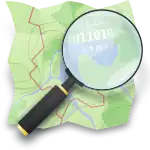 Geographic data related to Amherst, Massachusetts at OpenStreetMap
Geographic data related to Amherst, Massachusetts at OpenStreetMap- Digital Amherst, an online repository of historic information about Amherst
- Town of Amherst Collection at the Amherst College Archives & Special Collections
